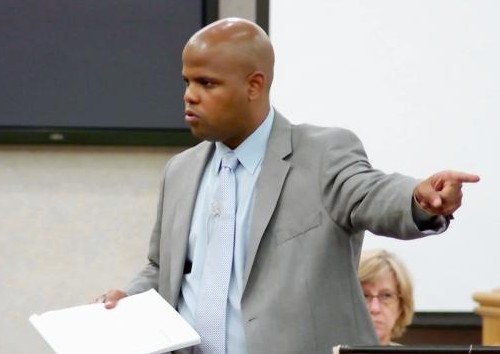
HBO has been on fire with their summer documentary series, but the highlight thus far has definitely been Gideon’s Army. Fifty years ago, the Supreme Court ruled in Gideon v. Wainwright that everybody deserves legal representation in the court system, and if somebody cannot afford representation, then the state must provide an attorney for them. Gideon’s Army follows the lives of three of those attorneys who are called “public defenders.”
 The job of a public defender is difficult and under-appreciated. A public defender might represent about one hundred clients at a time for very little money, which often falls far short of what they need to pay off massive debts from law school. In the documentary, it’s heart-wrenching to see these young, idealistic attorneys being crushed by the weight of their jobs. One lawyer, Brandy, always comports herself with the sweetest of demeanors, but talks about how she is falling apart on the inside. In a particularly painful scene, she recalls one client she represented who was accused of raping his twelve year-old daughter. She says, “I went to meet with him and expected him to tell me he was innocent and tell me why. Instead, he went on to describe in graphic detail how he raped his daughter and did it all with a smile on his face. It made me so sick I had to concentrate on not throwing up. I just thought, ‘how in the world can I defend this man?’” The main case that Brandy is working on throughout the film is defending a young man named Demontes Wright, who is charged with armed robbery. The trial in the courtroom at the climax of the movie may have you on the edge of your seat. You see just how invested Brandy is in this young man’s future, and how personal she has made her work.
The job of a public defender is difficult and under-appreciated. A public defender might represent about one hundred clients at a time for very little money, which often falls far short of what they need to pay off massive debts from law school. In the documentary, it’s heart-wrenching to see these young, idealistic attorneys being crushed by the weight of their jobs. One lawyer, Brandy, always comports herself with the sweetest of demeanors, but talks about how she is falling apart on the inside. In a particularly painful scene, she recalls one client she represented who was accused of raping his twelve year-old daughter. She says, “I went to meet with him and expected him to tell me he was innocent and tell me why. Instead, he went on to describe in graphic detail how he raped his daughter and did it all with a smile on his face. It made me so sick I had to concentrate on not throwing up. I just thought, ‘how in the world can I defend this man?’” The main case that Brandy is working on throughout the film is defending a young man named Demontes Wright, who is charged with armed robbery. The trial in the courtroom at the climax of the movie may have you on the edge of your seat. You see just how invested Brandy is in this young man’s future, and how personal she has made her work.
Another one of the three, Travis, is consumed by his job, ignoring his girlfriend at 11:00 at night so he can keep working. He also puts records of his acquittals on his office wall, while tattooing the names of the cases he’s lost on his back. Easily the most heart-breaking moment of the film is a case Travis works on tirelessly, defending a young man named Brandon, who is facing up to a life sentence for stealing $96. Travis is set to take the case to trial when Brandon’s best friend and co-defendant agrees to testify against him in exchange for a lesser sentence. Forced to enter a plea, they throw themselves at the mercy of the judge. Travis says to the judge, “We would ask the court for grace in the sentence that they render.” Begging for grace for the accused or guilty, interposing yourself between the Law and the defendant, at deep financial and emotional cost – it’s a breathtaking picture, and one that happens every day in courtrooms across the country.
It’s not much of a stretch to say that Travis, Brandy, and the third lawyer, June, serve as imperfect Christ figures in this narrative. They defend the sinners for virtually nothing. They identify with them. Oftentimes their work puts them in harm’s way. Brandy describes one case in which she would always go to the jail where a client was every time he called, even though she knew there would be nothing new. She fought her hardest for this client and eventually lost. Later she was warned by some of her other clients (who actually appreciated the work she was doing for them) that that same man was plotting her murder, shifting blame and anger onto her.
In this light, perhaps the notion that Christ intercedes for and defends repeat offenders like you and me–even when we show no signs of being “corrected”–is not unrealistically judicial but tremendously hopeful and concrete. The difference between Jesus and the public defenders, of course, is that Jesus becomes guilty for us, over and over, once for all. Through his sacrifice on the cross, interposing himself between his flock and the Law, we are always acquitted.
[youtube=http://www.youtube.com/watch?v=99HMxN94bEc&w=600]

COMMENTS
3 responses to “Gideon’s Army and the Best Attorney There Is”
Leave a Reply














Quick clarification:
The Court in Gideon v. Wainwright held that the Sixth Amendment right to counsel in criminal cases extends to felony defendants in state courts. This is narrower than “everybody deserves legal representation in the court system, and if somebody cannot afford representation, then the state must provide an attorney for them.”
Yeah, great point. Here’s a really helpful NPR piece.
http://www.npr.org/blogs/codeswitch/2013/06/30/196664265/a-look-at-three-types-of-lawyers-who-defend-the-poor
The first paragraph provides some great clarification. Also, a really interesting listen!
Thanks for the post, Win (well, that’s weird). It brings back fond memories my time as an ADA and how much I admired the public defenders with whom I worked.